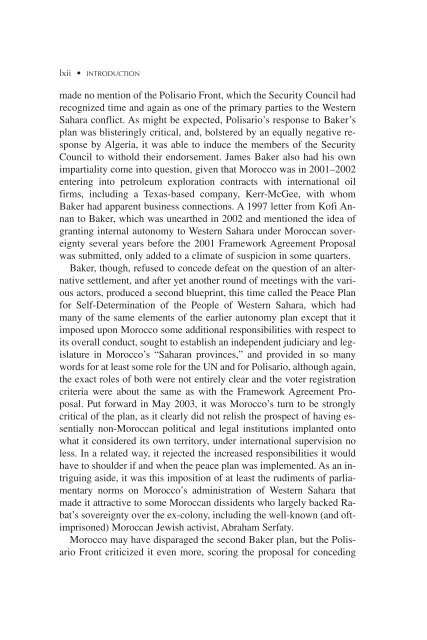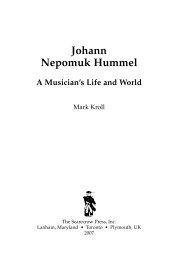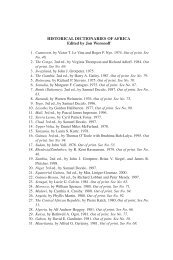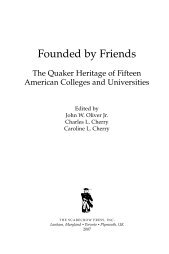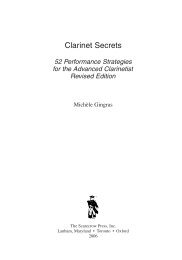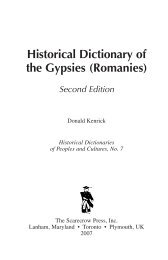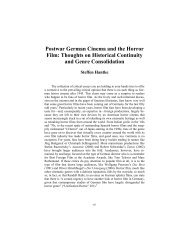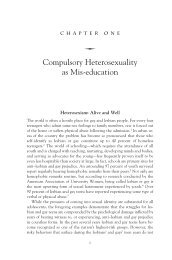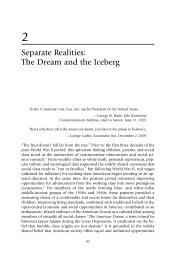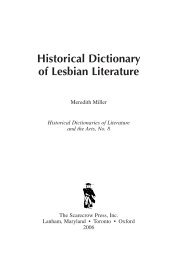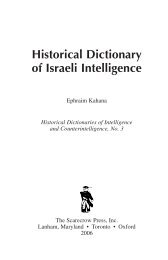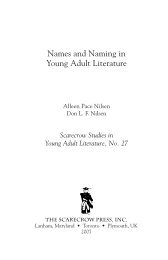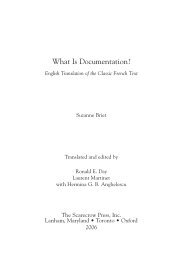Historical Dictionary of Western Sahara Third ... - Scarecrow Press
Historical Dictionary of Western Sahara Third ... - Scarecrow Press
Historical Dictionary of Western Sahara Third ... - Scarecrow Press
You also want an ePaper? Increase the reach of your titles
YUMPU automatically turns print PDFs into web optimized ePapers that Google loves.
lxii • INTRODUCTION<br />
made no mention <strong>of</strong> the Polisario Front, which the Security Council had<br />
recognized time and again as one <strong>of</strong> the primary parties to the <strong>Western</strong><br />
<strong>Sahara</strong> conflict. As might be expected, Polisario’s response to Baker’s<br />
plan was blisteringly critical, and, bolstered by an equally negative response<br />
by Algeria, it was able to induce the members <strong>of</strong> the Security<br />
Council to withold their endorsement. James Baker also had his own<br />
impartiality come into question, given that Morocco was in 2001–2002<br />
entering into petroleum exploration contracts with international oil<br />
firms, including a Texas-based company, Kerr-McGee, with whom<br />
Baker had apparent business connections. A 1997 letter from K<strong>of</strong>i Annan<br />
to Baker, which was unearthed in 2002 and mentioned the idea <strong>of</strong><br />
granting internal autonomy to <strong>Western</strong> <strong>Sahara</strong> under Moroccan sovereignty<br />
several years before the 2001 Framework Agreement Proposal<br />
was submitted, only added to a climate <strong>of</strong> suspicion in some quarters.<br />
Baker, though, refused to concede defeat on the question <strong>of</strong> an alternative<br />
settlement, and after yet another round <strong>of</strong> meetings with the various<br />
actors, produced a second blueprint, this time called the Peace Plan<br />
for Self-Determination <strong>of</strong> the People <strong>of</strong> <strong>Western</strong> <strong>Sahara</strong>, which had<br />
many <strong>of</strong> the same elements <strong>of</strong> the earlier autonomy plan except that it<br />
imposed upon Morocco some additional responsibilities with respect to<br />
its overall conduct, sought to establish an independent judiciary and legislature<br />
in Morocco’s “<strong>Sahara</strong>n provinces,” and provided in so many<br />
words for at least some role for the UN and for Polisario, although again,<br />
the exact roles <strong>of</strong> both were not entirely clear and the voter registration<br />
criteria were about the same as with the Framework Agreement Proposal.<br />
Put forward in May 2003, it was Morocco’s turn to be strongly<br />
critical <strong>of</strong> the plan, as it clearly did not relish the prospect <strong>of</strong> having essentially<br />
non-Moroccan political and legal institutions implanted onto<br />
what it considered its own territory, under international supervision no<br />
less. In a related way, it rejected the increased responsibilities it would<br />
have to shoulder if and when the peace plan was implemented. As an intriguing<br />
aside, it was this imposition <strong>of</strong> at least the rudiments <strong>of</strong> parliamentary<br />
norms on Morocco’s administration <strong>of</strong> <strong>Western</strong> <strong>Sahara</strong> that<br />
made it attractive to some Moroccan dissidents who largely backed Rabat’s<br />
sovereignty over the ex-colony, including the well-known (and <strong>of</strong>timprisoned)<br />
Moroccan Jewish activist, Abraham Serfaty.<br />
Morocco may have disparaged the second Baker plan, but the Polisario<br />
Front criticized it even more, scoring the proposal for conceding


